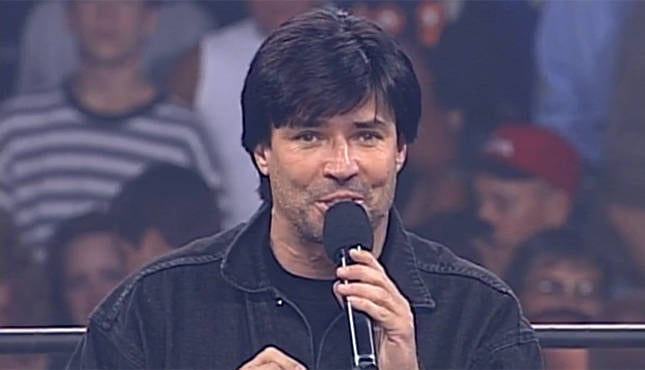wrestling / News
Eric Bischoff On If There Was Pressure To Succeed After 2000 WCW Reboot, Didn’t Like Hogan vs. Kidman
 Image Credit: WWE/Peacock
Image Credit: WWE/Peacock
On a recent episode of 83 Weeks, Eric Bischoff discussed WCW Slamboree 2000. Bischoff talked about if there was any pressure following the reboot in April 2000 and the storyline between Hulk Hogan and Billy Kidman. Some highlights are below.
On if there was any pressure following the restart of WCW in 2000: “I didn’t feel any pressure, to be honest. Look, it was what it was. It was a freaking mess. When I came back in 2000, WCW was far worse off in every way than they were when I left. I kind of looked at it as a long-term rebuilding plan. There really was no pressure. There was pressure because we needed to be successful. We needed to re-establish the brand. We needed to change the way people perceived WCW because of what had been happening for the previous year, year and a half. Since mid 1998, really end of 98. So, we had a lot of work to do in terms of rebranding ourselves not so much in name renaming the company, but reconnecting with our audience, rebuilding the confidence and the trust of our audience in the product and our ability to deliver a product. That was pressure. But, the financial side of it, I didn’t even pay attention. I wasn’t even concerned about it. Because, there’s no way that there was anything that we could do given that short period of time to have any kind of significant effect on the revenue. It was a six to twelve month rebuild. It was going to take six months or a year to begin to regain the confidence and the market share of the audience at that point in time. So, in many ways there was no pressure because WCW was in such a hole that there was nowhere to go but up. It was all about rebuilding.”
On the storyline between Hulk Hogan and Billy Kidman: “Didn’t like it. Thought it was a bad idea. Largely because there was no real story behind it that mattered, but it wasn’t done because it was a great creative idea. That decision, and Hulk approved that, Hulk didn’t have to do it, but I think Hulk was so tired of hearing, not so much in the dirt sheets he didn’t read the dirt sheets. But, this general narrative that existed he was aware of that he wouldn’t do business and he wouldn’t put people over. I think it was a death by a thousand cuts and he finally said f*** it I’ll work with you man. That’s what the company wants, that’s what I’ll do. He didn’t do it like I’ll do it, but I’m not going to get him over. He didn’t have to do it. He could have said no I’m not going to do it at all, but he wanted to be a team player. This was Hulk trying to be a team player to overcome a narrative that not only existed in the peripheral dirt sheet news media, but also was an issue backstage. Because, a lot of what Vince Russo did when he first came in was bury Hulk Hogan and a lot of the older guys and that was Russo’s thing man. ‘These guys are too old, they’re too old.’ Well, that had ramifications and you saw Vince Russo, again when he first came in, bringing in a lot of guys that nobody ever heard of before and smaller guys and greener guys. Guys with less talent. Vince Russo’s deal was ‘I’m gong to bring these young guys in and I’m gonna prove that these young guys can compete with WWE, and he was dead wrong.
“That was his deal, and it was also a way for Russo to endear himself with a significant part of the roster. Because, there was a lot of those young guys that weren’t main event ready yet and some of them weren’t even TV ready yet. But, when you got a guy like Vince Russo, who for a minute was head of creative, talking about all the opportunity he’s going to give to all this under utilized talent even though they were underutilized because they should have been, many of them. What are they going to do? They are going to support the new boss. Because that’s where their opportunity lies and that a period of weeks and months that created kind of a us versus them mentality in the roster with a lot of the older guys. The Lex Luger’s, the Hulk Hogan’s, the Randy Savage’s, the Sting a lot of people didn’t know where they stood now that they’re considered the old guys. That’s why we created the (New Blood) to take advantage of that or try to mitigate it and turn a negative into a positive. It’s exactly why we created New Blood, whatever we called the older guys at the time. It was all about creating separation. It was my idea to create the New Blood versus Millionaires storyline and scenario to turn that negative that existed not only in the narrative, but also on the roster in the locker room turn that into a positive and try to make it work for us.”
If you use any of the quotes in this article, please credit 83 Weeks with a h/t to 411mania.com for the transcription.
More Trending Stories
- Backstage Update on WWE’s Plans for WrestleMania 41, Possible Move to March or May
- Tony Khan Addresses CM Punk’s Claims That He Paid for His Medical Care for Torn Triceps Injury
- Eric Bischoff Wouldn’t Put Money On Chances Of Vince McMahon Starting A New Wrestling Company
- Oklahoma Athletic Commission Gives AEW ‘Warning’ Over Nyla Rose Match, Rose Responds







